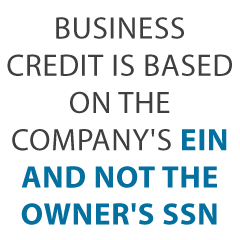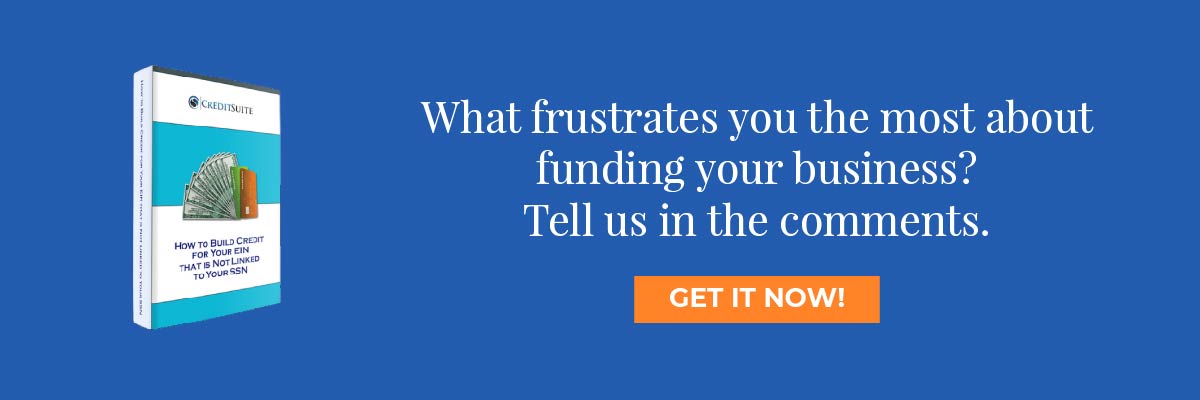- Connect With Us!
- (877) 600-2487
- info@creditsuite.com
Power up Your Dream with Small Business Funding for Startups
Published By Janet Gershen-Siegel at October 30th, 2017
Get Terrific Small Business Funding for Startups and Unleash Golden Opportunities
Do you recognize how to get small business funding for startups? As a new company, by definition, you have no or little business credit history, so it can be hard.
When you ask: What is the credit score of a new business? But the answer is, it’s usually not so hot. But don’t worry! Here are some ideas which will work.
Small Business Funding for Startups: Use your Personal Credit to Get Going
Eventually, you will need to stop doing so, but initially, you have got to get your startup off the ground. And this means you will need to have developmental capital.
If you have decent personal credit, then you can tap into it to get your startup, well, started.
Once you have a history and a decent payment track record, then you can deal with getting your business line of credit.
Having a decent consumer credit score will go a long way to demonstrating to financial institutions that you are trustworthy. And it shows will pay your debts in a timely manner.
Small Business Funding for Startups: Guarantee with Personal Assets and Collateral
What happens if your consumer credit is not so hot? Collateral is basically when you use something (or a number of things) of value to guarantee your payments.
But, as you may expect, if you default, you will relinquish your collateral. Still, it is a good way to bankroll a company with bad credit.
As always, pay off your invoices on schedule and completely. And don’t borrow beyond what you can repay comfortably. After all, now your second vehicle (or something like that) is on the line if you’re late with payments.
Learn more here and get started toward building business credit attached to your company’s EIN and not your SSN.
Small Business Funding for Startups: Your Best Bet is to Build Business Credit
But what happens if you don’t have good personal credit and you don’t want to go with a personal guarantee? Or what if you don’t have collateral to offer?
Why Build Business Credit in the First Place?
One of the best ways to get small business funding for startups is to simply establish business credit. Business credit is an asset which can help your small business in years to come.
Small business credit is credit in a small business’s name. It doesn’t link to an owner’s personal credit, not even when the owner is a sole proprietor and the solitary employee of the business. Because of this, an entrepreneur’s business and consumer credit scores can be very different.
The Advantages
Because business credit is independent from consumer, it helps to secure an entrepreneur’s personal assets, in case of litigation or business bankruptcy. Also, with two separate credit scores, an entrepreneur can get two different cards from the same vendor. This effectively doubles purchasing power.
Another advantage is that even startup ventures can do this. Going to a bank for a business loan can be a recipe for frustration. But building business credit, when done right, is a plan for success.
Individual credit scores are dependent on payments but also other components like credit use percentages. But for business credit, the scores really only hinge on whether a business pays its invoices in a timely manner.
The Process
Building company credit is a process, and it does not occur without effort. A business will need to actively work to build business credit. Nonetheless, it can be done easily and quickly, and it is much quicker than building individual credit scores.
Merchants are a big part of this process.
Performing the steps out of order will lead to repetitive denials. Nobody can start at the top with small business credit. For instance, you can’t start with store or cash credit from your bank. If you do, you’ll get a denial 100% of the time.
Learn more here and get started toward building business credit attached to your company’s EIN and not your SSN.
Business Fundability
A business must be fundable to lenders and vendors. That is why, a business will need a professional-looking website and email address, with site hosting from a supplier such as GoDaddy.
Additionally business telephone and fax numbers ought to have a listing on ListYourself.net.
Likewise the business phone number should be toll-free (800 exchange or the equivalent).
A business will also need a bank account dedicated strictly to it, and it must have every one of the licenses essential for running. These licenses all have to be in the exact, appropriate name of the company, with the same business address and telephone numbers.
So keep in mind that this means not just state licenses, but potentially also city licenses.
Working with the Internal Revenue Service
Visit the IRS web site and acquire an EIN for the business. They’re free. Select a business entity such as corporation, LLC, etc.
A company can start off as a sole proprietor. But they will most likely want to switch to a sort of corporation or partnership to reduce risk and make best use of tax benefits.
A business entity will matter when it comes to taxes and liability in case of litigation. A sole proprietorship means the owner is it when it comes to liability and tax obligations. No one else is responsible.
If you operate a business as a sole proprietor, then at the very least be sure to file for a DBA (‘doing business as’) status.
If you do not, then your personal name is the same as the small business name. As a result, you can end up being directly responsible for all business debts.
And also, according to the Internal Revenue Service, using this arrangement there is a 1 in 7 possibility of an IRS audit. There is a 1 in 50 possibility for corporations! Steer clear of confusion and dramatically reduce the chances of an Internal Revenue Service audit at the same time.
Kicking Off the Business Credit Reporting Process
Begin at the D&B website and get a cost-free DUNS number. A DUNS number is how D&B gets a business into their system, to generate a PAYDEX score. If there is no DUNS number, then there is no record and no PAYDEX score.
Once in D&B’s system, search Equifax and Experian’s websites for the business. You can do this at https://oldcs.creditsuite.com/reports/. If there is a record with them, check it for correctness and completeness. If there are no records with them, go to the next step in the process.
In this manner, Experian and Equifax will have something to report on.
Trade Lines
First you ought to establish trade lines that report. This is also referred to as vendor accounts. Then you’ll have an established credit profile, and you’ll get a business credit score.
And with an established business credit profile and score you can begin acquiring revolving store and cash credit.
These varieties of accounts tend to be for the things bought all the time, like coffee, shipping boxes, outdoor work wear, ink and toner, and office furniture.
But first of all, what is trade credit? These trade lines are credit issuers who will give you initial credit when you have none now. Terms are oftentimes Net 30, versus revolving.
Therefore, if you get approval for $1,000 in vendor credit and use all of it, you must pay that money back in a set term, like within 30 days on a Net 30 account.
Details
Net 30 accounts need to be paid in full within 30 days. 60 accounts must be paid fully within 60 days. In comparison with revolving accounts, you have a set time when you must pay back what you borrowed or the credit you used.
To begin your business credit profile properly, you ought to get approval for vendor accounts that report to the business credit reporting agencies. Once that’s done, you can then use the credit.
Then repay what you used, and the account is on report to Dun & Bradstreet, Experian, or Equifax.
Not every vendor can help in the same way true starter credit can. These are vendors that will grant an approval with negligible effort. You also need them to be reporting to one or more of the big three CRAs: Dun & Bradstreet, Equifax, and Experian.
But you may need to apply more than once to these vendors, and you may need to buy some things you don’t need to have, to demonstrate you are reliable and will pay in a timely manner. Consider donating unwanted things to charity.
Revolving Store Credit
Once there are 5 to 8 or more vendor trade accounts reporting to at least one of the CRAs move onto revolving store credit. These are companies like Office Depot and Staples. These companies are more likely to have items you need.
Use the small business’s EIN on these credit applications.
One example is Lowe’s. They report to D&B, Equifax and Business Experian. They want to see a DUNS and a PAYDEX score of 78 or more.
Fleet Credit
Are there 8 to 10 accounts reporting? Then progress to fleet credit. These are businesses like BP and Conoco. Use this credit to buy, repair, and take care of vehicles. Make certain to apply using the small business’s EIN.
Cash Credit
Have you been responsibly handling the credit you’ve gotten up to this point? Then move to cash credit. These are service providers such as Visa and MasterCard. Keep your SSN off these applications; use your EIN instead.
These are companies such as Walmart and Dell, and also Home Depot, BP, and Racetrac. These are commonly MasterCard credit cards. If you have 14 trade accounts reporting, then these are attainable.
Monitor Your Business Credit
Know what is happening with your credit. Make certain it is being reported and take care of any errors as soon as possible. Get in the practice of checking credit reports and digging into the particulars, and not just the scores.
We can help you monitor business credit at Experian and D&B for 90% less than it would cost you at the CRAs. See: https://oldcs.creditsuite.com/business-credit-monitoring. Update the details if there are errors or the info is incomplete.
Contesting Mistakes
So, what’s all this monitoring for? It’s to challenge any problems in your records. Mistakes in your credit report(s) can be corrected. But the CRAs normally want you to dispute in a particular way.
Disputing credit report mistakes generally means you send a paper letter with duplicates of any proof of payment with it. These are documents like receipts and cancelled checks. Never send the originals. Always send copies and keep the original copies.
Disputing credit report errors also means you specifically spell out any charges you challenge. Make your dispute letter as understandable as possible. Be specific about the issues with your report. Use certified mail so that you will have proof that you sent in your dispute.
Learn more here and get started toward building business credit attached to your company’s EIN and not your SSN.
Business Credit Building Pays Off For Small Business Funding for Startups and Established Companies
Always use credit responsibly! Never borrow more than what you can pay off. Keep track of balances and deadlines for payments. Paying promptly and completely will do more to raise business credit scores than nearly anything else.
Building small business credit pays off. Great business credit scores help a business get loans. Your lender knows the small business can pay its debts. They recognize the company is bona fide.
The company’s EIN attaches to high scores, and lenders won’t feel the need to call for a personal guarantee.
Small Business Funding for Startups: Be Responsible with Any Credit You’ve Got, Which Includes Personal
This may feel a bit like an obvious fact, but your use of currently existing credit will be precisely what any creditor (trade or banks, etc.) will use to establish if you can pay your statements on schedule. And they will decide if you are, as a result, what is considered a good credit risk.
Suddenly blowing all of your personal credit at the tables in Las Vegas won’t endear you to potential creditors. Startup businesses especially, irrespective of how meticulous they are, are normally seen as the full credit package.
That is, both personal and business credit scores may be under consideration. If you seem like a poor credit risk on the consumer credit side, then you’ll seem to be a similarly poor credit risk on the business side of things.
Small Business Funding for Startups: Takeaways
Startups can be successful, despite the fact that the probabilities are long. But if a startup has their own business line of credit, that can make it a bit easier to thrive.
Discover this new way to get small business funding for startups.

 " class="attachment-blog-single size-blog-single wp-post-image" alt="Get Business Credit Cards for New Businesses Credit Suite-Business Line of Credit Decoded" title="Get Business Credit Cards for New Businesses">>
" class="attachment-blog-single size-blog-single wp-post-image" alt="Get Business Credit Cards for New Businesses Credit Suite-Business Line of Credit Decoded" title="Get Business Credit Cards for New Businesses">>